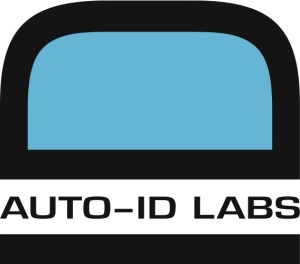Robert Hylton Madge (born 2 April 1952) [1] is a British entrepreneur and technologist.
Robert Hylton Madge (born 2 April 1952) [1] is a British entrepreneur and technologist.
In the 1980s, he founded and was chairman of Madge Networks, [2] a pioneer of high speed networking technology.
Once he was the President of IDTrack, [3] a European Association for identification and traceability of goods based on technologies such as RFID. He was also the founder of Olzet, a provider of services associated with the implementation of RFID solutions in the food industry.
He was President of the European Association for Secure Identification.
Radio-frequency identification (RFID) uses electromagnetic fields to automatically identify and track tags attached to objects. An RFID system consists of a tiny radio transponder, a radio receiver and transmitter. When triggered by an electromagnetic interrogation pulse from a nearby RFID reader device, the tag transmits digital data, usually an identifying inventory number, back to the reader. This number can be used to track inventory goods.

Near-field communication (NFC) is a set of communication protocols that enables communication between two electronic devices over a distance of 4 cm (1.57 in) or less. NFC offers a low-speed connection through a simple setup that can be used to bootstrap more capable wireless connections. Like other "proximity card" technologies, NFC is based on inductive coupling between two so-called antennas present on NFC-enabled devices—for example a smartphone and a printer—communicating in one or both directions, using a frequency of 13.56 MHz in the globally available unlicensed radio frequency ISM band using the ISO/IEC 18000-3 air interface standard at data rates ranging from 106 to 424 kbit/s.

The Auto-ID Labs network is a research group in the field of networked radio-frequency identification (RFID) and emerging sensing technologies. The labs consist of seven research universities located on four different continents. These institutions were chosen by the former Auto-ID Center to design the architecture for the Internet of Things together with EPCglobal. The federation was established in 1999; the network they have developed is at the heart of a proposal sponsored by EPCglobal and supported by GS1, GS1 US, Wal-Mart, Hewlett-Packard, and others to use RFID and the Electronic Product Code (EPC) in the identification of items in the supply chain for companies. The areas of expertise range from hardware to software to business research related to RFID.

Digital Angel, Corp. is a developer and publisher of consumer applications and mobile games designed for tablets, smartphones and other mobile devices, as well as a distributor of two-way communications equipment in the U.K.
Automatic identification and data capture (AIDC) refers to the methods of automatically identifying objects, collecting data about them, and entering them directly into computer systems, without human involvement. Technologies typically considered as part of AIDC include QR codes, bar codes, radio frequency identification (RFID), biometrics, magnetic stripes, optical character recognition (OCR), smart cards, and voice recognition. AIDC is also commonly referred to as "Automatic Identification", "Auto-ID" and "Automatic Data Capture".

HID Global is an American manufacturer of secure identity products. The company is an independent brand of Assa Abloy, a Swedish door and access control conglomerate. Björn Lidefelt was appointed CEO on 27 January 2020. He succeeded Stefan Widing, who led HID Global for over four years.

An ear tag is a plastic or metal object used for identification of domestic livestock and other animals. If the ear tag uses Radio Frequency Identification Device (RFID) technology it is referred to as an electronic ear tag. Electronic ear tags conform to international standards ISO 11784 and ISO 11785 working at 134.2 kHz, as well as ISO/IEC 18000-6C operating in the UHF spectrum. There are other non-standard systems such as Destron working at 125 kHz. Although there are many shapes of ear tags, the main types in current use are as follows:
A tracking system, also known as a locating system, is used for the observing of persons or objects on the move and supplying a timely ordered sequence of location data for further processing. It is important to be aware of human tracking, further details are listed below.

A contactless smart card is a contactless credential whose dimensions are credit-card size. Its embedded integrated circuits can store data and communicate with a terminal via NFC. Commonplace uses include transit tickets, bank cards and passports.

Intermec is a manufacturer and supplier of automated identification and data capture equipment, including barcode scanners, barcode printers, mobile computers, RFID systems, voice recognition systems, and life cycle services.
Information and communication technology in agriculture, also known as e-agriculture, focuses on the enhancement of agricultural and rural development through improved information and communication processes. More specifically, e-agriculture involves the conceptualization, design, development, evaluation and application of innovative ways to use information and communication technologies (ICTs) in the rural domain, with a primary focus on agriculture. ICT includes devices, networks, mobiles, services and applications; these range from innovative Internet-era technologies and sensors to other pre-existing aids such as fixed telephones, televisions, radios and satellites. Provisions of standards, norms, methodologies, and tools as well as development of individual and institutional capacities, and policy support are all key components of e-agriculture.
Deister Electronic is the name generally used to refer to Deister Electronic GmbH Barsinghausen, Germany, and its subsidiaries in North America. Deister Electronic is an industrial enterprise specialised on electronic non-contact identification and security systems founded in 1977. In North America, the companies are Deister Electronics USA, Inc. of Manassas, VA, and Deister Electronics, Inc. of Ontario, Canada.
Real-time locating systems (RTLS), also known as real-time tracking systems, are used to automatically identify and track the location of objects or people in real time, usually within a building or other contained area. Wireless RTLS tags are attached to objects or worn by people, and in most RTLS, fixed reference points receive wireless signals from tags to determine their location. Examples of real-time locating systems include tracking automobiles through an assembly line, locating pallets of merchandise in a warehouse, or finding medical equipment in a hospital.
A human microchip implant is any electronic device implanted subcutaneously (subdermally) usually via an injection. Examples include an identifying integrated circuit RFID device encased in silicate glass which is implanted in the body of a human being. This type of subdermal implant usually contains a unique ID number that can be linked to information contained in an external database, such as identity document, criminal record, medical history, medications, address book, and other potential uses.

Josef Preishuber-Pflügl is an Austrian technology leader.
CISC Semiconductor GmbH defines itself as “design and consulting service company for industries developing embedded microelectronic systems with extremely short Time-To-Market cycles.” The company started in 1999, working in the semiconductor industry, but soon expanded its field towards the automotive branch and further extended business towards the radio frequency technology (RFID) sector in 2003. Since then, CISC gained significant experience and expertise in RFID, developing an own business segment and highly sensitive measurement equipment to test and verify RFID systems for different industries. Representatives of CISC Semiconductor are actively working on and contributing to worldwide standardization of future technologies like RFID, in different standardization organizations. This effort brings CISC into the position of being a leader in research and development, and thus being able to be “one step ahead of innovation”. As of 2011 CISC Semiconductor is in a globally leading standardization position for RFID testing by providing the convener of ISO/IEC JTC1 WG4/SG6 on “RFID performance and conformance test methods“, as well as GS1 EPCglobal co-chairs for performance and conformance tests.
Barcode technology in healthcare is the use of optical machine-readable representation of data in a hospital or healthcare setting.
B.O.S. Better Online Solutions is a publicly traded company, headquartered in Israel, that provides RFID and supply chain solutions. Its shares are traded on the NASDAQ Capital Market.
Medical device connectivity is the establishment and maintenance of a connection through which data is transferred between a medical device, such as a patient monitor, and an information system. The term is used interchangeably with biomedical device connectivity or biomedical device integration. By eliminating the need for manual data entry, potential benefits include faster and more frequent data updates, diminished human error, and improved workflow efficiency.

The term digital card can refer to a physical item, such as a memory card on a camera, or, increasingly since 2017, to the digital content hosted as a virtual card or cloud card, as a digital virtual representation of a physical card. They share a common purpose: Identity Management, Credit card, or Debit card. A non-physical digital card, unlike a Magnetic stripe card can emulate (imitate) any kind of card. Other common uses include loyalty card and health insurance card; physical driver's license and Social Security card are still mandated by some government agencies.